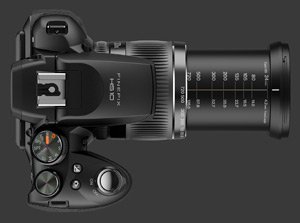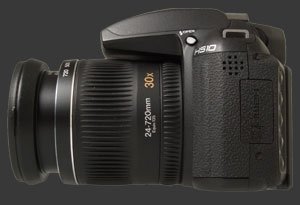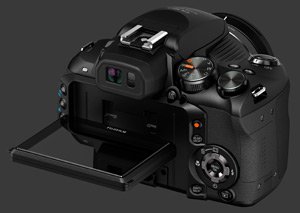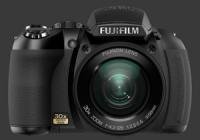Fujifilm Finepix HS10 Review
Fujifilm Finepix HS10 Introduction
The Fuji Finepix HS10 is an SLR-styled ultra-zoom with the most versatile zoom range to date. It's 30X optical zoom has an amazing 24-720mm equivalent range, starting ultra-wide and reaching beyond most super-telephoto lenses. The lens is mechanically-linked for smooth, quick and precise control. Like most ultra-zooms of a similar form-factor, the HS10 has a complement of manual controls.
Internally, the HS10 shows a departure from traditional Fuji ultra-zooms, now using a BSI-CMOS sensor that allows for a number of features which require fast processing, no longer using their reputable SuperCCD.
These new CMOS-driven features include:
- Full 1080p HDVT video recording at 1920x1080 @ 30 FPS
- High-speed movie options from 60 to 1000 FPS
- 10 FPS Continuous drive
- Sweeping panorama
- Pro Low-Light
- Motion removal
- Multi-motion
The basic feature set includes:
- 10 Megapixels high-speed BSI-CMOS sensor
- ISO sensitivity ranging from 100 to 6400, all at full-resolution
- Mechanically-linked 30X stabilized optical zoom lens with electronic focus ring
- Shutter speeds from 1/4000s to 30s at base ISO, dropping by one stop for each ISO stop
- Selectable dynamic range from 100% to 400%
- Complete set of manual controls
- Hot-shoe for external flashes
Fujifilm Finepix HS10 Suitability - What is it good for?
The Fuji Finepix HS10 is defined by its unique lens. The huge range with built-in stabilization allows it to cover a range of photographic subjects like no other. Ultra-wide is perfect for architecture, sweeping landscapes, indoor shots and monuments. On the other extreme a reach of 720mm makes it suitable for wildlife and even birding. To reach a similar range on a DSLR would require the use of a lens weighing several kilos and costing in the thousands of dollars. Needless to say, all other photo applications are covered: portraits, street photography, sports and more.

The mechanical-link allows smooth and quick framing of subjects. Notice that we did not say precise because the HS10 suffers from a cropped view-finder, so unlike the flagship S200EXR, framing is not so exact. Having no zoom motor not only saves energy, it also produces completely silent zooming while filming video.
The digital camera is designed for efficient access to its manual controls and offers a large number of buttons to directly control the camera without entering the menu. It is this kind of efficiency that makes it usable in a hurry.
High-speed features such as a 10 FPS drive mode and pre-capture makes it more usable that similar cameras for action. The low-light side of things is covered by its ISO 100 to 6400 range which is good for many uses. At the extreme of low-light, the HS10 stops being usable before its peers due to a slowest shutter-speed that is reduced by one stop for each ISO. At ISO 100, the HS10 can take 30s exposures, at ISO 200 it gets reduced to 15s, by ISO 6400 the limit is a paltry 1/2s. We suspect this is the case because the noise-characteristics of the CMOS sensor would ruin images otherwise.
Pictures from the HS10 can be printed nicely in sizes up to 16 "x12" thanks to 10 megapixels of resolution and a little too much smearing from noise-reduction at all ISO sensitivities. Near the wide-angle end, the camera can focus as close as 1 cm using super-macro mode. The Fuji HS10 also allows control over the dynamic range it captures. Possible options are 100%, 200% and 400%, although these are not available at all ISO settings and reduce image quality in shadow areas.
Both storage and power use the most convenient and readily available formats: SDHC for memory and most types of AA batteries for power. The power meter can be tuned to the specific type of battery in use and the HS10 can rejuvenate rechargeable batteries.
Fujifilm Finepix HS10 Capability - What can it do?
Beyond taking pictures in a large variety of conditions, it packs some useful and interesting features. Below is a list of its most useful features, followed by explanations, when required.
- Dynamic range: 100%, 200% and 400%.
- White-balance: Auto, 6 preset and custom, all fine-tunable in 7 steps on Red-Cyan and Blue-Yellow scales.
- Metering: multi-segment, spot and average.
- Focus control: single auto focus, continuous auto focus, manual focus.
- Auto focus modes: center, multi-pointCamera chooses a point to focus on, areaUser selects an area to focus on or tracking.
- Drive modes: single frame, first 7-frames, best-frame capture.
- Exposure compensation: +2 to -2 EV, in 1/3 stop increments.
- Flash compensation: -2/3..+2/3, 1/3 EV steps.
- Exposure bracket: 3 shots, 1/3, 2/3 or 1 EV steps.
- Flash modes: auto, on, off, slow-sync.
- Face detection with or without redeye removal.
- Photography modes: fully automatic, program automatic, shutter priority, aperture priority, manual, custom, 19 scene-modes and sweeping panorama.
- Color, tone and sharpness each adjustable in 3 steps.
- Other: Auto exposure lock or toggle and focus check.
The Fuji Finepix HS10 offers adjustable dynamic range using something often called highlight-correction. The magic happens using the camera's processor rather than a special sensor design as with the EXR models. At ISO 100, only a normal dynamic range is obtainable, at ISO 200 once can boost the DR to 200% and at ISO 400 and above, up to 400% DR can be captured. This gives two more stops of highlight headroom.
Color is controllable using traditional color (saturation), tone (contrast) and sharpness parameters. There are only 3 steps on each scale, so flexibility is limited. The overall color can be adjusted between normal, chrome (very vivid), black-and-white and sepia. White-balance is very flexible on the other hand.

Best-frame-capture is a sophisticated mode to capture an ideal frame from continuous action. It starts working as soon as the shutter is pressed halfway, continuously capturing images of which only a few are stored, then adding more images after the shutter is fully pressed. The speed at which it does this is controllable between 3 and 10 FPS and number of before and after frames is selectable, as long as the total is 7 images. So one can get 5 images before, 1 image during and 1 image after or 3 images before, 1 during and 3 after, or any other combination which adds up to 7. There is a noticeable lag in this and the continuous drive mode but it is much better than with most fixed-lens cameras. At least the display mostly keeps up.
The 19 scene modes are divided into a set of 16 and a set of 3. Any of the 16 can be accessed by any of the to SP positions on the mode-dial. The other 3 are called, Advanced Scene Modes: Pro Low-Light, Multi Motion and Motion Remover. Pro Low-Light takes 4 images to combine them into one image with reduced noise. This is similar to what image software call stacking. The two remaining advanced modes limit image resolution to 5 megapixels. Multi-Motion takes 5 images during 1/2 to 20 seconds. The result is similar to multiple exposure but with a mask for the background. So anything that moves appears multiple times and the background looks as if it was exposed once. The Motion-Remover mode uses the same principle, except that it tries to removing any moving subjects by combining parts of a burst of images.

The sweeping panorama mode is designed to capture a panorama continuously in any direction. The output is limited to 720 pixels in landscape orientation and 1280 pixels wide in portrait mode, in the shortest dimension. In practice, this mode is extremely difficult to use since it requires steadiness and smooth panning. Most times it seems to fail for an unknown reason and, even when it does produce a panorama, artifacts are obvious.
The AE-L button either locks the exposure while it is pressed or sets it until it is pressed again. The Focus-Check button magnifies the center of the live-preview, to facilitate manual focusing or validating the auto-focus. While the display has improved compared to previous models, neither the LCD nor EVF is precise enough to make this entirely accurate.
 |
Please Support Neocamera
All information on Neocamera is provided free of charge yet running this website is a huge endeavor. Purchases made via affiliate links found throughout the site help keep it running and up-to-date. There is no additional cost to you, so please consider buying via these links to our affilates:
If you found any information on this site valuable and did not purchase via our affiliate links, please considering donating via PayPal:
Any amount will be greatly appreaciated. Thank you for your support!
Fujifilm HS10 Highlights

Sensor-Size: 6 x 5mm

Actual size when viewed at 100 DPI
| 10 Megapixels Ultra Zoom | ISO 100-6400 |
| 30X Mechanically Linked Ultra-Wide Optical Zoom | Shutter 1/4000-30s |
| Built-in Stabilization | Full manual controls, including Manual Focus |
| 0.20" Built-in EVF 200K Pixels | Custom white-balance with 2 axis fine-tuning |
| Automatic Eye-Start sensor | Spot-Metering |
| 10 FPS Drive, 7 Images | Hot-Shoe |
| 1920x1080 @ 30 FPS Video Recording | Standard AA Battery |
| 3" LCD 230K Pixels | Secure Digital High Capacity, Internal Memory |
Updates
2025.01.18

Fujifilm GFX 2025 Lens Roundup
Lens Review roundup of Fujifilm GFX Medium-Format lenses. Quality, performance and handling of the GF20-35mm F/4R WR, GF30mm F/3.5 Tilt-Shift and the GF55mm F/1.7.
2024.11.18

Best 2024 Photography Gifts for Every Budget
Great gifts for photographers and photo enthusiasts selected for every budget among the best products of 2024.
2024.08.07

Eye Protection Tips for Professional Photographers
The four main considerations for professional photographers regarding eyewear.
2024.07.14

Fujifilm X100VI Review
Flagship fixed-lens compact digital camera with a 40 MP sensor and Image-Stabilization, a first for the series. Retro design featuring dual control-dials, plus direct ISO, Shutter-Speed and EC dials. Its hybrid viewfinder can switch between EVF and OVF mode.
2024.05.09

Fujifilm GFX100 II Review
Flagship 102 Megapixels Medium-Format Mirrorless Digital Camera with 8-Stop 5-Axis IBIS, 8 FPS Drive, 8K Video and 400 MP Super-Resolution capture in a weatherproof and freezeproof body with dual control-dials and dual memory-card slots.
2024.04.03

Fujifilm X-T5 Review
Newest Fujifilm flagship boasting a 40 MP APS-C sensor, 5-axis IBIS with 7-stop efficiency, 15 FPS continuous drive, 6.2K Video capture, dual control-dials and dual SDXC UHS-II slots in a sturdy weatherproof and freezeproof body.
2023.11.20

Best Digital Cameras of 2023
Find out which are the Best Digital Cameras of 2023. All the new Mirrorless Digital Cameras from entry-level to high-end professional.
2023.07.10

Fujifilm X-H2 Review
40 Megapixels APS-C Hybrid Mirrorless Digital Camera with 7-stop IBIS. Fastest shutter ever and 8K video capture. Large builtin EVF with 0.8X magnification and 5.8 MP, plus an Eye-Start Sensor. Packed with features and large number of controls in a weatherproof and freezeproof body.
2023.05.07

Sony FE 20-70mm F/4G Review
Review of the unique Sony FE 20-70mm F/4G lens. The optical zoom of this lens spans ultra-wide-angle and medium focal-length coverage, making it one of the most versatile Full-Frame lenses on the market.
2023.01.15

Huion Inspiroy Dial 2 Review
Review of the Huion Inspiroy Dial 2 tablet, a medium sized drawing surface with dual dials and customizable buttons. Connects via USB-C or Bluetooth 5.0 with Windows, Linux and Android support.
2022.12.08

How to Pack for a Photo Trip
Find out how to pack for a travel photography trip, carry your gear safely while meeting airline regulations.
2022.11.13

Best Digital Cameras of 2022
The best digital cameras of 2022. A short list of the most outstanding models in their respective categories. Choose one for yourself or as a gift.












